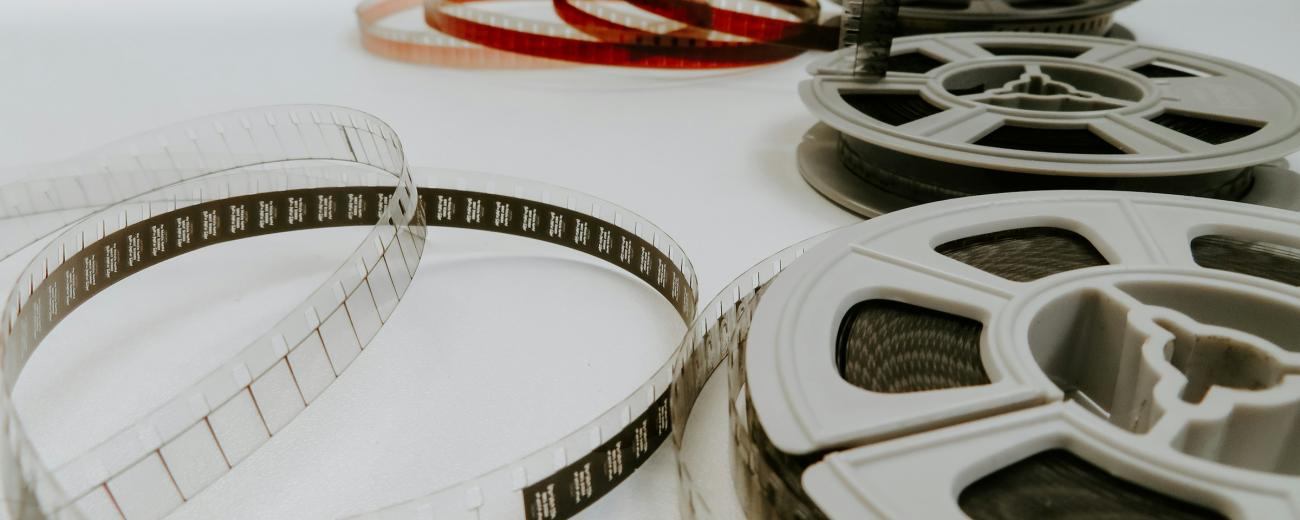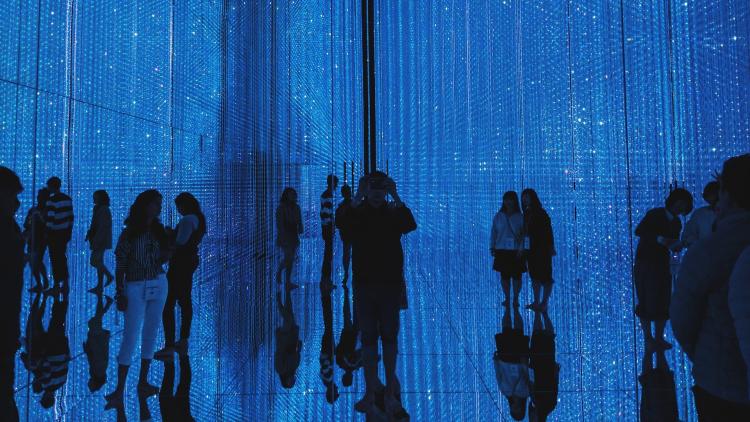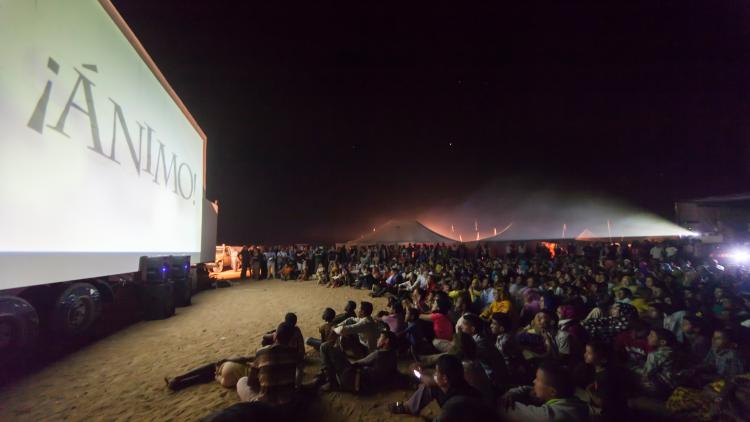Careers: "SOAS changed my life and really affected me as a filmmaker"


Filmmaker Hamida Issa studied MA Global Cinema and the Transcultural (now MA Global Creative and Cultural Industries) back in 2014. We sat down with her to talk about her life, her time at SOAS and her filmmaking career to date.
"I was part of a wave of filmmaking in Qatar."
I’m half Qatari, half Saudi. I left Qatar when I was seven years old and I grew up in London. I went to school, did my Bachelor's at UCL and then my Master’s at SOAS.
When I graduated from UCL in 2009, I didn’t know what I was going to do with my life. I got an email about an ethnographic documentary filmmaking short course over the summer and everything lit up inside of me. I made a film about smiles on the streets of London. A documentary filmmaker who went and lived with the yogis in India taught me how to use a camera, taught me about the ethics of documentary filmmaking, and how to edit.
While I was doing this, I heard that there was the first film festival happening in Qatar back home and I thought ‘This is a sign. I need to move back to Qatar and work for this festival.’
I worked as an assistant in the press department, ended up being MC on opening night and got a permanent job with them. We launched Doha Film Institute, so I was part of a wave of filmmaking in Qatar. I made my first proper short film as a part of their educational workshops in 2011, and this film screened at the Doha Tribeca Film Festival. Since then, I've made many shorts, and I've just finished my first feature film.
"I'm searching for the roots of my identity and the way we were as a people."
I am the first Qatari woman to go to Antarctica, where I shot my feature documentary, along with filming in Qatar. It's an essay-style film called Places of the Soul. It’s been eight years in the making, so it's like I grew up with this film.
It started off being an environmental expedition, where we wanted to go to Antarctica and learn about what's happening, but it evolved and became more of a spiritual, reflective essay on my loss of my mother who passed away when I was 13, my motherland, and the loss of mother nature. It became a love letter to the metaphor of ‘mother’ in life and what that means to me.
The film is about duality and juxtaposition – from the ice desert to the sand desert – and the duality of existence, and nature and civilisation. The way I portray my country is shooting nature. I don't shoot modernity. I'm searching for the roots of my identity and the way we were as a people, so in the Bedouins, in the pearl divers, in the generation of my grandparents and how quickly it's changed in literally two generations.
My films Elevate and 15 Heartbeats were fiction, but they were based on some experiences in my life. Elevate was part of the Qatar Film Fund and it was the biggest set I had ever worked with. There were 35 people and we built elevator sets. It was a crazy production and a great experience.
Elevate is about a Qatari woman who gets stuck in an elevator with her Filipino maid and it's a commentary on classism, on society, materialism, and humanity. I got stuck in an elevator for three hours and when I got out, I had this idea of writing a film because I had a panic attack; I had a proper existential crisis. I was 23 when it happened. I started writing the script and it took five years for me to develop the script properly under the right mentorship and then get it ready for it to shoot, because I was taking my time and I was at SOAS.
I was shooting film the entire time I was at SOAS. I have all this footage, and I was planning on doing a film about the anthropology of SOAS. I still have all the interviews, everything from the Hare Krishna to people who were studying there and I think that maybe it's time to go back to the archives.
SOAS honestly changed my life. The books I read, the people that I met, it really opened up my mind to so many things in the world that I wouldn't have if I hadn’t gone.
I collaborated with the band 47Soul on the video for the song Gamar. The reason I was introduced to 47Souls was because of SOAS alumni. Kareem Dennis, aka Lowkey, the rapper who also studied at SOAS, was on tour and we went to a gig in Angel and 47Soul were opening the gig. As soon as I walked in, I thought, ‘who are these people? I need to direct a music video for them.’ I’ll never forget the way they spoke to my identity.
"I also make films because I'm obsessed with intangible cultural heritage."
I think that it all started with my mother. My feature film Places of the Soul is a love letter to her. She filmed my entire childhood and I inherited the tapes. Growing up, I would take the camera from her and want to document things. I think that it was something that she handed down to me in my subconscious. I never correlated the two things, I never put two and two together until I started editing my feature film and I had to go back to the archives. That's when I realised where it all began.
I also make films because I'm obsessed with intangible cultural heritage. The change that's happened to my country and to our region has been so fast that there's a whole generation that are dying with knowledge that isn't being preserved. We are trying to preserve it, but it's such a wealth that it takes a huge initiative to be able to document everything.
I think I make films to heal. It's my art therapy, it’s my own way of exploring what I feel about the world, what I feel about myself, what's inside my soul, and what I want to share with the world. This is my way of exploring that. It's like narrative archaeology.
"It’s a very special time to be a filmmaker in the region."
I'm still discovering [my future aspirations]. I'm writing Seven Waves. It takes a while to develop the script, so I'm building the world, and I'm writing. I think that development of the script usually would take a couple of years if you're very dedicated and then you can go into pre-production. But you obviously have to raise funds.
It's not about awards, it's about sharing a story. I want to collaborate with people from the region and not only from the region, but all over the world. One of the courses I did at SOAS was anthropology and I'm really into ethnography and exploring other cultures, not in the colonial sense obviously, in an empowered sense.
At Georgetown University Qatar they have an ethnographic Qatari course. They asked me to screen my films and talk about ethnography and my life experiences. So it's not only aspirations as a filmmaker, but I want to teach and I want to do a PhD.
I started my own production company called Feryal Films, which is named after my mum. The idea of it isn't just a production company, it's a collective of filmmakers, musicians and artists from the underground and the region. Film is an art that has so many different facets to it and music is a huge part of it. Also the philosophy, the depth behind cinema, I find that very intriguing.
There is a new wave of filmmakers coming out of the Arabian Gulf region from my generation and younger. I wrote about it in my dissertation for SOAS and I called it the ‘Khaleeji new wave of cinema.’ We are living in an exciting time where we have the support to explore and discover our cinematic language and there are many different colourful experimentations, especially in the field of art house cinema. The seeds that were planted a decade ago at the beginning of my career are now beginning to flourish. It’s a very special time to be a filmmaker in the region.
SOAS changed my life. When I did the Iranian cinema course, it really affected me as a filmmaker; it changed my world. The poetic realism, the way they blur the line between fiction and reality. They have a poetic consciousness in their culture and the way it's translated in cinema is something astounding.



